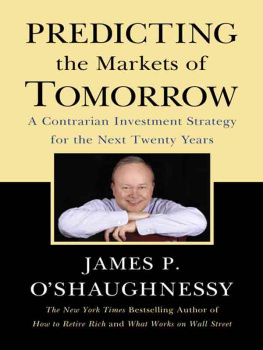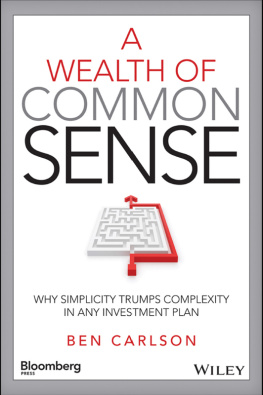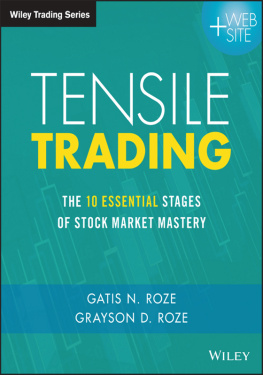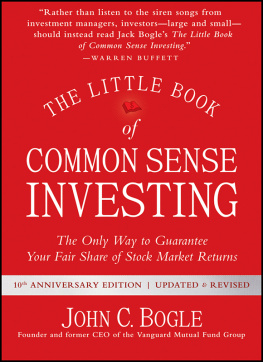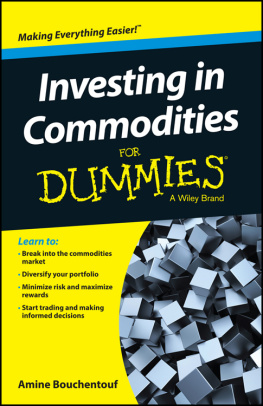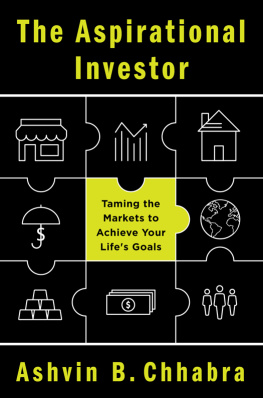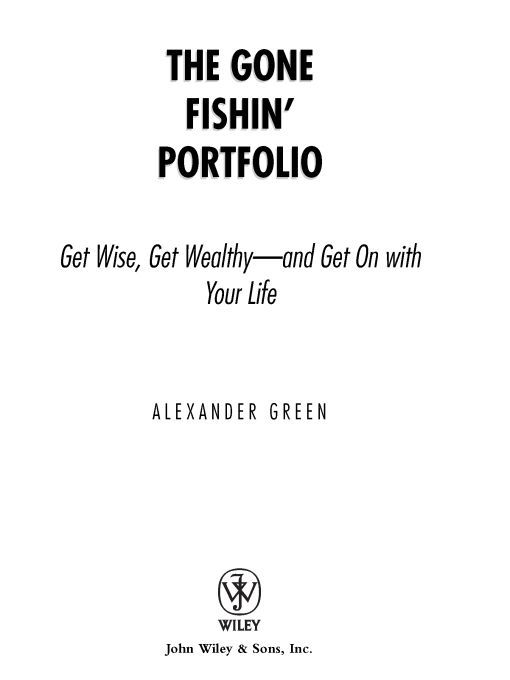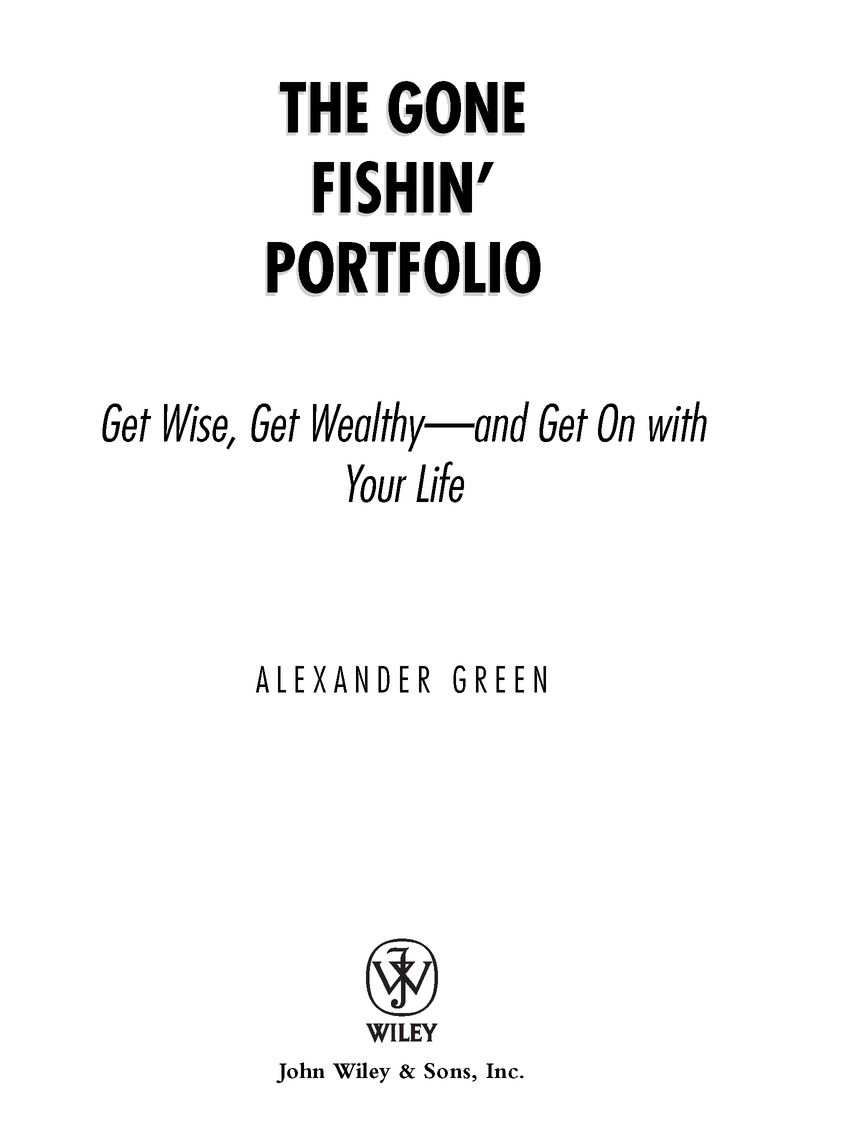Table of Contents
This book is dedicated to Judith and Braxton Green. If there is one thing
I know how to do, its pick the right parents.
If a man writes a book, let him set down only what he knows. I have guesses enough of my own.
Johann Wolfgang von Goethe
FOREWORD
You have no idea what good hands youre in. I do...
You see, at this point Im now one of the worlds most widely read investment analysts. Im not quite sure how I got here. I dont have a gimmick. I dont promise zillion-percent returns overnight. I think Im here because Ive given consistently good advice over my career.
One of the best pieces of advice I can give you today is this: Listen to Alex Green.
I know that Alex Green is better than I am at what I do. Darn it, the guy always has been.
I started out in the business as an investment advisor. Alex worked at the same firm. It was obvious why people trusted him with their lifes savings, and why, too, he was in a league of his own.
You see, Alex has an extraordinary ability to see an investment idea before anyone else. And he combines that with another extraordinary abilityhe can communicate complicated investment ideas in plain language.
Sometimes Id sit in his office and just listen to him talk to his clients. Id go back to my desk inspired and try to emulate him. But I couldnt come close.
I concluded that Alexs brain somehow works a hair quicker than even the smartest of us.
Ive accomplished everything you can in the investment world. Ive got a Ph.D. in this stuff, Ive worked for a billion-dollar New York hedge fund, and Ive literally traveled the world sizing up investmentsgoing to places as extreme as Iceland and Ecuador, and discovering big opportunities. Today, hundreds of thousands of people rely on my investment advice. And Im confident Im good at what I do.
I know Im smart. I know I make consistently good decisions. But my experience is, Alex Green is one step ahead of me.
How does he do it? I dont know. And it all looks so easy too... because it is for him. He just loves to soak everything up. But the nice thing about Alex is, none of this goes to his head.
This book, The Gone Fishin Portfolio, is classic Alex. Since its his first book, the temptation had to be great for him to dazzle you with all he knows. Instead, he took the opposite approach.
He clearly asked himself, What is the simplest, most useful piece of investment advice I can share with a wide audience of investors?
The answer is what you have in your hands right now.
In my view, most of the books in the investment section of your local bookstore are garbage. Theyre either too simplistic or too pie-in-the-sky. More often than not, you finish them and ask yourself, Now what do I do?
This book is differentand rare. It provides a simple but sophisticated strategy that actually works, written in plain language, by a brilliant investor.
And you wont wonder what to do. He tells you what to do, very specifically. He shows you exactly where to put your money and in what percentages. He also tells you what you need to do to keep your portfolio on track. It takes only a few minutes a year. Whats not to like?
When I say you are in good hands with Alex Green, Im saying it from deep down in my toes. I dont offer up praise lightly. But I have known him for over 15 years, and I can confidently say that Alex is as smart an investor as youll ever find.
If you want to make more money safely from your investments, you really cant do better than Alex Green. Believe me; Ive tried.
DR. STEVE SJUGGERUD
Editor, True Wealth
April 24, 2008
St. Helier, New Jersey
PREFACE
In July 2001, I retired from the securities industry at the ripe old age of 43. After 16 years as an investment advisor, research analyst, and portfolio manager, I had gone from a net worth of approximately zero to financial independence.
I was now free to do whatever I wanted, wherever I wanted, with whomever I wanted. Its called total financial freedom. And I can tell you from experience, its a great feeling.
Unfortunately, many of my clients had not become financially independent. This was not because I advised them poorly. As an investment advisor, I dealt with my clients honestly and gave them the best advice and service I could.
Yet, in many ways, they operated at a disadvantage. Some clients had a poor understanding of investment fundamentals. Others found it impossible to commit to a long-term investment plan. Many were simply too emotional about the markets, running to cash at the first hint of danger.
Contrarian instincts are rare, too, I learned. Few people are emotionally stirred by low stock prices. But I am one of them. Every time there was a correction, a crash, or financial panic, my Scottish blood would surge, my pulse would rise, Id rub my hands together, and start buying.
My clients often did just the opposite. They were more inclined to curse loudly, sleep little, and hurl epithets, some unrepeatable. Unfortunately, strong emotions like these are often a prelude to bad investment decisions.
Then there was the other small matter of my firms fee schedule. Investment professionals dont get into the industry because the work is meaningful but low paying. You become a broker, a financial planner, an insurance agent, or a money manager to get rich. And most of us do, eventually. In truth, what youre paying your financial advisor is probably too much. Many investors arent doing that well because their advisor is doing too well.
This story is as old as Wall Street itself. In his book Where Are the Customers Yachts?, originally published in 1940, Fred Schwed Jr. tells the story of a visitor to New York who is taken to the harbor and shown the impressive yachts that belong to the bankers and brokers. A tad naive, the visitor asks, but where are the customers yachts?
Where indeed.
Im not suggesting this is all Wall Streets fault. Clients are rarely abducted and forced at gunpoint to sign account-opening forms. Nor can advisors make important investment decisions without their clients consent (not without landing in the hoosegow, anyway). We all need to take responsibility for the decisions weve made, including the decision to delegate important responsibilities.
Since retiring from life as a registered investment advisor seven years ago, Ive been busy living what I call the second half of my life. Ive been writing about the financial markets for Agora Publishing, the worlds largest publisher of investment letters.
Currently, I am the investment director of The Oxford Club, the worlds largest financial fellowship with over 70,000 members. I am also chairman of Investment U, an Internet-based investment research service with over 300,000 subscribers. (As a sideline, I also write SpiritualWealth, a twice-weekly e-letter dedicated to ideas about how to live a richer, more meaningful life Feel free to check it out at SpiritualWealth.com. Its free.)
Frankly, being a writer instead of an investment advisor suits me better. I can give advice freely and no one who heeds it has to wonder whether my real motive is to earn fees or commissions or capture their assets. I can write what I want about the market without a compliance officer scrutinizing my words. And my readers dont have to worry about the objectivity of my analysis. I have no business relationships with the companies I cover, no investment banking colleagues seeking customers for new bond issues or secondary offerings, no reason to tell anything but the plain truth as I see it.


